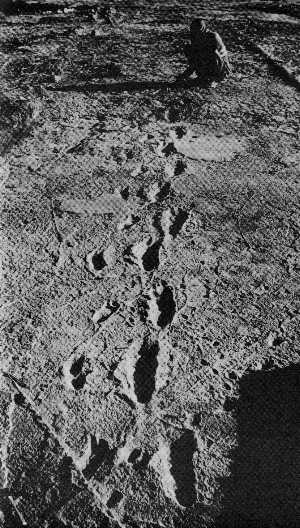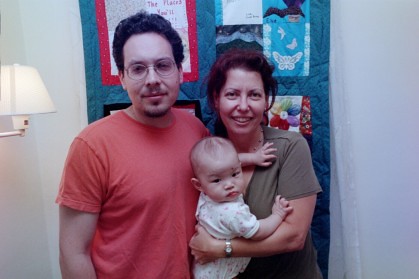|
|
Saturday, June 12th, 2010
My and Mariana's exchange of Spanish books continues -- yesterday I gave her El informe de Brodie (she says she and every other Argentinian student read Borges' stories in her High School classes but has not gone back to them since then) and she gave me Galeano's Bocas del tiempo and El palacio japonés by José Mauro de Vasconcelos (translated from the Portuguese, and with a foreword, by Haydée M. Jofro Barroso).
posted morning of June 12th, 2010: Respond
➳ More posts about Brodie's Report
|  |
If they were single threads, if they did not yet form parts of a common weft: some of the stories here collected were printed in newspapers, magazines. Wading into this pool, those primary forms have changed in shape and in color.(from the front page of Bocas de tiempo)
Bocas de tiempo I see characterized as a memoir in snatches of poetry, something like Summertime; sort of a poetic essay. Maybe more like Breytenbach than like Coetzee. (Funny that it seems wrong to characterize it as a collection of short stories, it needs to be some other genre presented as short stories.) But "memoir" doesn't quite describe it, since it's about a lot more than the narrator's/author's life. It is in translation as Voices of Time: a life in stories (which I have not read) and I'm wondering about trying it as Mouths of Time. (The artwork in the book, which Galeano describes in his foreword as "[tiendas] miles de años de edad, pero [pareciendas] hechas la semana pasada, " is alas not available that I know of online.*)
Time which speaks
We are part of time.
We are its feet and its mouths.
Time's feet walk, they are our feet.
Soon, you know what I'm talking about, sooner or later time's wind will erase our footsteps.
A journey across nothing, nobody's footsteps? Time's mouths recount its voyage.
And more journeying:
The Voyage
Oriol Vall, whose business is the recently born in a hospital in Barcelona, he says that the first human gesture is the embrace. Coming out into the world, at the beginning of their days, they reach out as if searching for someone.
Other doctors, those who busy themselves with the already born, have told me that the aged, at the end of their days, they die seeking to lift up their arms.
That's how it is, for all the approaches we might try to the subject, all the words we may pile on it. This is what everything comes down to, shorn of all explication: between your two wings is where the journey occurs.**
  And more traces: And more traces:
Footprints
This pair came walking down the beach, in the east of Africa, the rainy season bathing them. This woman and this man still look enough like monkeys; truth be told they are already walking upright and have no tail. A nearby volcano -- today it is called Sadiman -- has been spewing gusts of ash from its mouth. The dust has preserved the traces of the pair, until this time, across all time. Beneath the gray mantle have remained, intact, the footsteps. These feet tell us -- today -- they tell us this Eve and this Adam came walking together, when at a certain point she stopped, looked away, walked a few paces from him. Then she came back to his side. Human footprints -- the oldest ones -- have left the mark of doubt.*** Some few years have passed. The doubt is still with us.
* Not that I've necessarily spent any time looking for it.
**I wonder about this reading: This is what I initially thought was meant by "Entre dos aleteos, sin más explicación, transcurre el viaje." The authorized translation has, "Between two flutterings, with no more explanation, the voyage occurs." -- the 'flutterings' being the raising of arms at birth and at death. I imagine that is the correct reading...
***cf. Mary Leaky, writing in National Geographic about the footprints at Laetoli:
You need not be an expert tracker to discern this motion -- the pause, the glance to the left, seems so intensely human. Three million, six hundred thousand years ago, a remote ancestor -- just as you or I -- experienced a moment of doubt.
posted evening of June 12th, 2010: Respond
➳ More posts about Readings
|  |
Sunday, June 13th, 2010
Two more pieces from Bocas del tiempo:
One Body
Leaning on their white walking sticks, buoyed up by a slug of booze, they made their way somehow or other through the streets of Tlaquepaque.
It looked like they were on the brink of falling over, but no: when she stumbled, he held her up; when he staggered, she straightened him out. The two walked together; the two sang together. They always stopped in the same place, in the shadow of the gate, and sang in their broken voices, old Mexican airs of love and of war. They were playing some instrument, maybe a guitar, I can't remember, it helped them stay near the key. Between songs, they would shake the dish where they were collecting coins from the respectable public.
Later on they left. Their walking sticks in front of them, they passed through the crowd under the sun and lost themselves in the distance, ragged and torn, arm in arm, supporting each other in the torrent of the world.
The Kiss
 Antonio PujÃa chose at random one of the blocks of Carrara marble which he had collected over the course of the years. Antonio PujÃa chose at random one of the blocks of Carrara marble which he had collected over the course of the years.
It was a tombstone. It had come from some grave, who knows from where; he had not the slightest idea of how it had come to his workshop.
Antonio lay the stone on a stand, and went to work on it. He had some rough idea of what he would sculpt; or perhaps he had none. He began by wiping clean the inscription: a man's name, his year of birth, the year of his passing.
Next, his chisel bit into the marble. Antonio found a surprise, what he had been hoping to find inside the stone: a vein in the shape of two faces touching one another, like two profiles touching at the foreheads, nose touching nose, lips touching lips.
The sculptor obeyed the stone. He went on excavating, gradually, until he completed the relief contained in that stone.
The next day, his work was done. And then when he raised the sculpture up, he saw what he had not seen previously. On the back of the stone was a second inscription: A woman's name, her year of birth, the year of her passing.
posted evening of June 13th, 2010: Respond
➳ More posts about Translation
| |
|
Drop me a line! or, sign my Guestbook.
•
Check out Ellen's writing at Patch.com.
| |

